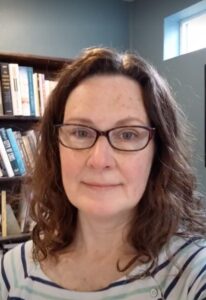UW-Green Bay
Associate Professor
History
Kimberley Reilly is chair of History, co-chair of Women’s, Gender, & Sexuality Studies, and associate professor of Democracy & Justice Studies at UW-Green Bay. Her teaching interests include U.S. women’s history, legal history, the history of sexuality, and American consumer culture. Her current book project is a legal and cultural history of marriage in the late nineteenth- and early twentieth-century United States. Her research has been published in Law and History Review and the Journal of the Gilded Age and Progressive Era, and has been supported by the William Nelson Cromwell Foundation and the Institute for Research in the Humanities at the University of Wisconsin-Madison. She is the author of The Politics of Prosperity: Mass Consumer Culture in the 1920s (Oxford UP, 2020).
TEACHING AND LEARNING PHILOSOPHY
As a teacher and scholar, my work focuses centrally on the issues of equity, civic engagement, and social justice. My courses in History, Democracy & Justice Studies, and Women’s, Gender, & Sexuality Studies encourage students to question their assumptions, look for counterfactual evidence, and consider how we have come to tell the stories we tell about ourselves as individuals and Americans. Through this scholarly and pedagogical work, I explore how individuals and communities negotiate and shape the meaning of equality, challenge inequities, and advocate for the common good.
I tell my students that I became a historian because I see it as a radical practice. Students—really, most people, for that matter—generally associate history with facts and dates. For me, however, history is about looking into the past and uncovering beliefs, practices, and identities that are often alien to Americans living today. History reveals that the passage of time generates change, and that even the most supposedly timeless values and practices are remarkably transitory. As a feminist, I am empowered by the possibility that the taken-for-granted inequalities in our society can change. But I am also clear-eyed that change does not always lead to progress.
My objective as a teacher is to foster critical thinking skills in my students. “Critical thinking” is a frequently lauded goal in higher education these days, but for me it means challenging the consumerist and testing-oriented passivity that is often instilled in our students before they arrive on our campus. Many students come to our classrooms with the assumption that a college course should serve up facts-to-be-memorized via textbooks and Power Points. While I once judged this attitude to be a form of endemic intellectual apathy, experience has shown me that it is a product of the current educational climate. During K-12, our students were subjected to almost continuous standardized testing; and their curriculum in those years was often designed to increase their test scores. They have been told by family members, guidance counselors, and prospective employers that they are unemployable without a bachelor’s degree. Pursuing that degree will require them to borrow tens of thousands of dollars, but the credential itself holds little meaning in our culture beyond representing four years of study and the accumulation of 120 credits. Our state’s political leaders likewise describe the purpose of college as “workforce development.” It is little wonder, then, that many of our students arrive on our campus with little to no sense of agency in their own education. In this climate, I view the transmission of critical thinking skills as not simply a pedagogical goal, but an equity-minded ethical practice. I seek to disrupt the broad social assumption that a college student is the equivalent of a job-seeking customer who is instrumentally acquiring a diploma. I want our students to find jobs when they graduate, but I also want them to be knowledgeable and engaged citizens. I want them to be able to articulate their own proficiencies to their future employers, rather than relying on their college transcripts and GPAs. Critical thinking skills are the tools that achieve such aims.

